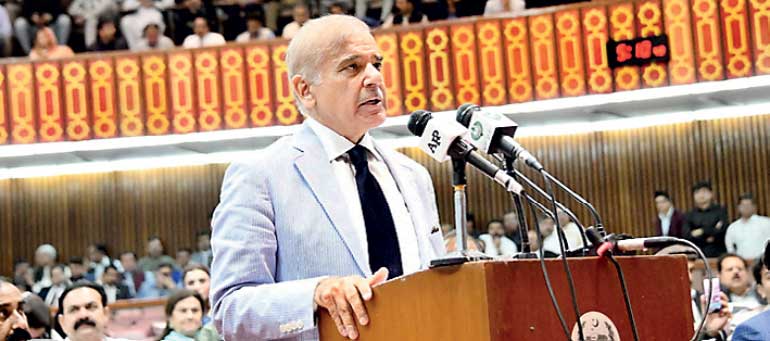Wednesday Feb 18, 2026
Wednesday Feb 18, 2026
Tuesday, 12 April 2022 04:44 - - {{hitsCtrl.values.hits}}

Pakistan’s Prime Minister-Elect Shehbaz Sharif, speaks after winning a parliamentary vote to elect a new Prime Minister, at the national assembly, in Islamabad, Pakistan 11 April – Reuters
ISLAMABAD (Reuters): More than 100 lawmakers loyal to Pakistan’s ousted Prime Minister Imran Khan resigned on Monday, creating a headache for the new, Western-friendly incumbent Shehbaz Sharif as he tries to drag his country out of the political and economic crisis.
Parliament’s election of Sharif, 70, as Prime Minister on Monday followed a week-long Constitutional crisis that reached a climax on Sunday when Khan lost a no-confidence vote in Parliament.
His departure from power sparked street protests and the mass resignation of MPs from Khan’s Pakistan Tehreek-e-Insaf Party in protest at the impending change of Government.
If the resignations are accepted by the Speaker, Pakistan would face the prospect of more than 100 by-elections within two months, a major distraction for Sharif and his coalition partners and a potential platform for Khan, 69, to mobilise his support.
That in turn could ensure the nuclear-armed nation of 220 million people remains prone to political and economic turbulence.
Sharif has a reputation domestically as an effective administrator more than as a politician. He is the younger brother of three-time Prime Minister Nawaz Sharif.
Analysts say Shehbaz, unlike Nawaz, enjoys amicable relations with Pakistan’s military, which traditionally controls foreign and defence policy.
After Monday’s vote, Sharif vowed to tackle an economic malaise that has seen the rupee hit an all-time low and the Central Bank implement the biggest hike in interest rates in decades last week.
“If we have to save the sinking boat, what we all need is hard work, and unity, unity and unity,” he told Parliament. “We are beginning a new era of development today.”
The younger Sharif emerged as the leader of a united Opposition to topple Khan, a former cricket star who has claimed that the United States was behind his downfall, which Washington has denied.